MercoPress. South Atlantic News Agency
Tag: Mothers of Plaza de Mayo
-
Tuesday, March 11th 2025 - 10:04 UTC
Founding member of Mothers of Plaza de Mayo passes away aged 95

Aída Bogo de Sarti, a founding member of the Madres de Plaza de Mayo Línea Fundadora, passed away aged 95 last Saturday, her family announced Monday in Buenos Aires. She became an icon of resistance after her daughter, Beatriz Sarti, was kidnapped and disappeared in May 1977 during the dictatorship (1976-1983). Joining other mothers like Azucena Villaflor in Plaza de Mayo, she turned her personal grief into a lifelong fight for memory, truth, and justice.“We mothers are saying goodbye little by little, leaving the best legacy we can,” the organization mentioned in a statement.
-
Friday, May 31st 2024 - 10:35 UTC
Mothers of Plaza de Mayo leader Nora Cortiñas dies aged 94

Mothers of Plaza de Mayo (Founding Line) President Nora Cortiñas died Thursday in Morón, on the western outskirts of Buenos Aires, from complications resulting from a hernia surgery she had undergone days earlier. The iconic human rights activist was 94.
-
Thursday, April 25th 2024 - 22:24 UTC
CFK announces her return to the limelight since leaving office

Just one day after being labeled a “political corpse,” former Argentine President (2008-2015) Cristina Fernández de Kirchner (CFK) announced her return into the limelight this coming Saturday when she will attend the opening of a gymnasium in the town of Quilmes on the outskirts of Buenos Aires which will be named after her late husband and also former head of State (2003-2008) Néstor Kirchner.
-
Monday, September 4th 2023 - 11:35 UTC
Argentina: Leftwing terrorism victims' event sparks reaction from human rights groups
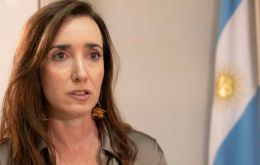
Human rights organizations in Argentina Sunday expressed their rejection of Libertarian Congresswoman and Vice-Presidential candidate Victoria Villarruel offering a “tribute” on Monday to the victims of terrorism in the 1970s at the Buenos Aires City Legislature.
-
Monday, November 21st 2022 - 10:45 UTC
Mothers of Plaza de Mayor Leader Hebe de Bonafibi dead at age 93
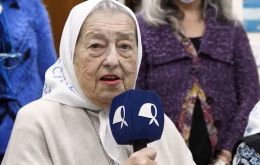
Hebe Pastor de Bonafini, Argentina's iconic Mother of Plaza de Mayo, died Sunday. She was 93. She had been discharged on Oct. 13 from a La Plata hospital but was admitted again on Nov. 12 after her health deteriorated.
-
Thursday, March 24th 2022 - 22:40 UTC
Thousands of Argentines march 46 years after coup d'état
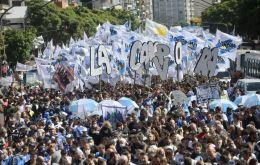
Tens of thousands of Argentines marched again to Buenos Aires’ Plaza de Mayo (Mayo Square) on Thursday, 46 years after the coup d'état that installed a dictatorship responsible for tens of thousands of disappearances, exiles and executions in clandestine centers.
-
Thursday, May 3rd 2018 - 08:22 UTC
Pope sends a greeting message to “Mothers of Plaza de Mayo” on their 41st anniversary

Pope Francis sent an audio message for the 41st anniversary of the “Madres de Plaza de Mayo” (Mothers of Plaza de Mayo), who protested against the disappearance of their children during the Dirty War (1976-1983) of Argentina’s military dictatorship.
-
Wednesday, March 25th 2015 - 06:53 UTC
Pro and against Kirchner rallies on 29th anniversary of 1976 military coup
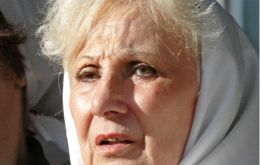
Human rights, political and social organizations commemorated on Tuesday 24 March the 29th anniversary of the military dictatorship that killed anywhere from 9.000 to 30,000 people, marking the beginning of one the darkest period in Argentina's modern history.
-
Thursday, November 7th 2013 - 08:19 UTC
Last Argentine military Junta had plans to remain in power until 2000
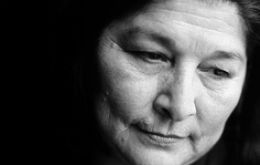
Neatly kept and organized documents dating to the start of Argentina’s last dictatorship, 1976/1983, shows the names of activists who went missing and citizens blacklisted under the regime, officials announced in Buenos Aires. The documents also show that the military junta had planned to hold onto power until 2000.
-
Friday, May 24th 2013 - 06:55 UTC
Former Ford executives charged in Argentina for human rights crimes

Three former Ford Motor Co. executives have been charged with crimes against humanity in Argentina for allegedly targeting union workers for kidnapping and torture after the country's 1976 military coup.
